Bird Bites - Don't Blame the Bird!
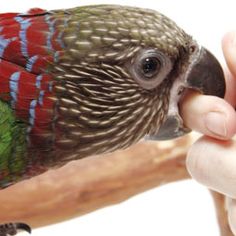 An all too common complaint from bird owners is that their bird bites. Indeed, most of us have been unexpectedly bitten by our birds at one time or another, seemingly for no reason at all. Bites can range anywhere from playful nips to severe bites causing blood loss, scarring, nerve damage and disfigurement. Being on the unpleasant end of the beak is not fun and it can hurt both physically and emotionally, if we let it.
An all too common complaint from bird owners is that their bird bites. Indeed, most of us have been unexpectedly bitten by our birds at one time or another, seemingly for no reason at all. Bites can range anywhere from playful nips to severe bites causing blood loss, scarring, nerve damage and disfigurement. Being on the unpleasant end of the beak is not fun and it can hurt both physically and emotionally, if we let it.
The truth is, aggressive biting is not a behavior that is commonly observed in parrots in the wild. In the wild, parrots are able to effectively communicate with their flock through the use of body language and vocalizations. Parrots in captivity, although driven by the same instincts as their wild counterparts, are forced to live in an "unnatural" setting where they often aren't afforded the same opportunity to choose flight to defend themselves and/or have their communications clearly understood by their human flock.
Although some biting is instinctually based, biting in captivity is largely a learned behavior. Given that, we can choose to take steps to eliminate this undesired behavior in our birds and learn to stop being the "victim". If our birds bite, the root cause is largely our own lack of understanding or sensitivity to their expressions of their needs. Biting often serves as a means of communication for a bird when all else fails.
Why Do Birds Bite?
The key to resolving biting issues is to first understand the nature and the context of the bite. Once you understand the reason, you can then determine the appropriate solution and alter the behavior. Bites can be classified in several ways:
Exploratory/Play Biting
The first question to ponder is, "was it really a bite"? Not all biting is based in aggression. For example, play biting and beak exploration is a developmental activity for young birds. Baby birds rely heavily on their beak to explore and test their surroundings. As a result, they often chew on the fingers and other interesting body parts of their caregivers (i.e., ear lobes, noses, eyebrows, etc.) Sometimes this exploration can be a little painful as they don't realize that this activity may cause discomfort.
| In this instance, some gentle guidance via a firm but quiet NO and a short time out will help young birds to learn play boundaries. Also, having an alternative chewing object for distraction on hand will be very helpful in teaching them what an acceptable chewing outlet is. If young birds are prone to rough-housing, be sure to offer praise and lavish lots of positive attention when they are calm. |
Territorial Biting
By nature, birds are territorial creatures and can react instinctively in an attempt to protect their "nests" or their favorite person from intruders. Since this type of biting is an instinctual reaction, it can be a difficult behavior to modify.
| If your bird demonstrates territorial aggression when you are feeding or cleaning their cage then a common sense approach to avoiding a bite is to remove the bird first before changing dishes, hanging new toys and cleaning their cage. Stick training will also be of great value in getting a bird from the cage and moved to a more neutral area. Additionally, having multiple play areas within in the house for your bird to "hang out" will make them less prone to territoriality. |
Hormonal Biting
Sometimes birds are more prone to biting during breeding season. This is more common to some species(for example Amazons and Cockatoos) than others. During these periods our feathered friends can be prone to rapid mood swings. The good news is that the breeding season, for most birds, is temporary and steps can be taken to reduce the impact of the season (check out our article: The Seven "Hormonal Parrot" Dwarfs)
| To avoid bites during hormonal periods, take great care in handling your birds to avoid over-stimulation which can trigger aggressiveness. Avoid all touching and petting on their backs and under their wings. Watch their body language for signs of "overload" such as pinning eyes, fanned tails and aggressive posturing. |
Stress Biting
Stress is a physiological reaction to a real or perceived threat. Stress causes a release of hormones that temporarily alters the physical body. This is called the "fight or flight" response. Stress can result from a wide variety of circumstances (check out our article: Avian Stress). Also, many birds are very empathic and have the ability to sense our moods. If you are in a highly stressed state, you are more likely to be bitten.
| Once you can identify the cause of your bird's stress then you can work towards eliminating that source. Stress can simply arise out of "forced" interaction when a bird is tired or does not want to interact. Respect your bird's body language and take the time to understand your bird's daily patterns. For example, are they more receptive to interaction at a particular time of day? When do they like to nap, preen, bathe, eat, play and vocalize? Don't push a bird to interact if they want to be left alone. |
Fear Biting
Parrots may bite if they become frightened. This is an instinctive self defense response (fight) to a perceived threat when they do not have a means of escape (flight). This type of bite can be triggered by loud unexpected noises, pain, "strange" people or objects and situations such as grooming activities or vet visits.
Anticipate situations that may stress or cause a fear reaction in your bird and remove the bird from that situation if possible. Early socialization and exposure of your bird to a wide variety of different foods, toys, environments, people and other birds will all add to your bird's learning experience and set the stage for how well he develops in his ability to form successful human bonds, adapt to change and to be a happy, less fearful bird. Also:
|
Displacement Biting
Some birds will bite their owner in an attempt to warn and protect them from a perceived danger. This is called displacement aggression and it is an instinctive reaction. Your bird is trying to get you to flee.
| Never let a bird prone to displacement biting sit on your shoulder. |
"I Don't Wanna" Biting
"I Don't Wanna" biting is a learned behavior. Through our reactions to certain situations our birds have learned from us that biting gets them something that they want or helps them avoid something they don't want. Examples of what this might mean to a bird are:
- Hey, I'm bored. Pay attention to me!
- Leave me alone!
- Give me some.
- I don't wanna go in my cage/carrier.
- I don't wanna share your attention.
| Remember the equation: Reaction = Reinforcement. Take care not to react in any way that rewards and reinforces your bird's biting behavior. |
Final Words of Wisdom
-
- Always practice patience, careful observation and consistency in your interactions with your bird.
- Become a student of and develop sensitivity to your bird's body language so you can tune into and better understand their primary means of communication.
- Successful relationships with birds are built on trust and respect. You can't control or dominate your bird and attempts to do so will result in more, not less, aggression. NEVER, EVER hit or throw your bird to the ground. This is abusive, both physically and emotionally.
- Utilize positive reinforcement training methods to teach fun behaviors and basic step up and step down maneuvers that can be used as a distraction technique to avoid a bite.
- If bitten:
- Remain calm.
- Put your bird down and provide negative reinforcement for the behavior by quietly withdrawing all attention for a few minutes.
- Take a moment to review the circumstances leading up to the bite to determine the trigger.
- Don't take it personally, don't give up and Don't Blame the Bird!
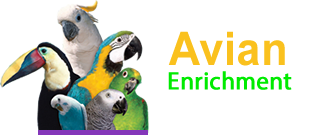



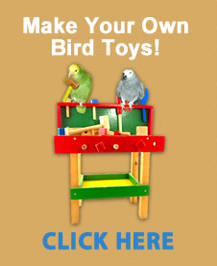
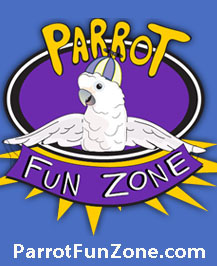
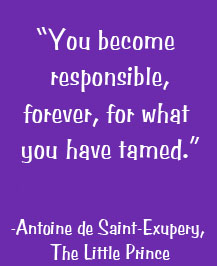
Comments powered by CComment